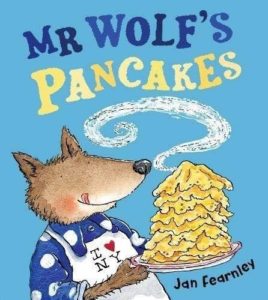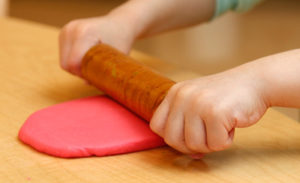This week, we’re going to find out what happens when Mr Wolf decides to cook some delicious pancakes. Listen to the story ‘Mr Wolf’s Pancakes’ and look at the illustrations in the video carefully as you watch. You might spot some familiar characters!

Here’s are this week’s activities to download in a PDF.
Reading
- Can you spot any other story characters that you recognise? Which story are they from? Have you read it?
- Why does Mr Wolf need some help at the beginning of the story?
- Were Mr Wolf’s friends helpful and kind? Why do you think they didn’t want to help?
- What happened when Mr Wolf started to cook his pancakes?
- Can you remember what happened at the end of the story? Do you think Mr Wolf should have shared his pancakes?
Phonics
Being able to copy a rhythm is part of our Phase One phonics learning; we often play simple ‘copy me’ type games as we’re waiting to wash our hands. Today, you’ll need two sticks or wooden utensils, or anything else that is similar! Listen to Mrs Gosper and then have a go at tapping the rhythms too.
Phonics – Rhythm pattern sticks
Mark-Making
- Mr Wolf said he wasn’t very good at writing. Can you help him write out a shopping list for going to the shops? What does he need to make his pancakes?
- If Mr Wolf wanted to have a pancake party and invite some friends to his house, what would he need to send them? That’s right, an invitation. Perhaps you could plan a Pancake Day party for next week and make some invitations to send to people in your house.
- Have a go at drawing or painting your favourite type of pancake. What toppings would you put on it?
- Open up your own ‘Pancake parlour’ and take orders. You’ll need to write down and tick off what your customers would like on their pancakes.
- Have you remembered it’s Valentine’s Day on Sunday 14 February? Why not make a card for someone in your family or see if you can post one to someone special that you might not be able to see at the moment?

Mathematics
This week, we’re going to practise our counting skills. In the story, Mr Wolf made lots of pancakes and we thought it’d be fun to make our own playdough pancakes. If you don’t have any dough, you could follow this simple recipe and have a go at making your own. Whilst making pancakes and playing, you could introduce ‘counting’ in different ways.

- How many pancakes have you made? Count each pancake, touching them as you say each number. Sometimes it helps to line objects up to ensure that you count each one only once and try to remember to stop at the last pancake. How many were there? Count again to make sure.
- Have you got more pancakes than me? How do you know?
- Who has the fewest pancakes? Children often understand the word ‘more’ or ‘most’ but struggle to understand the word ‘fewer’ or ‘fewest’.
- The Little Pigs are going to Mr Wolf’s house for a pancake party, how many pancakes do we need to make? Think about your child’s ability and keep the numbers below 5 or 10 as appropriate.
Extension ideas
- Introduce some real coins into your game. Children don’t need to be able to tell you what the denominations are in Nursery, they may just give you a handful of coins or some may count out 3 coins (of different values) and say “Here’s £3”. It’s all a great way to introduce and familiarise them with money. You could look at the different coins and try to sort them. How could you sort them? Big/little? Circle/not circles? Copper/silver?
- Do you remember playing ‘What time is it Mr Wolf’ at school? Children love to play this at Nursery still and it’s a good way of practising counting out the correct number of steps.
Creative
- We couldn’t read Mr Wolf’s pancakes and then not suggest that you make some pancakes! It’s a great, simple recipe for children to join in with and whisking is great for building upper arm strength too.
- What’s your favourite topping? Do you always have the same one? Use this as a time to try something new and talk about different flavours. Do you have sugar and lemon or golden syrup? Is it bitter/sweet/sour?
- With supervision, ask children to help you cut some soft fruit to put on their pancakes such as bananas or strawberries. Talk to them about using knives safely.
- If you don’t mind a bit (or lot!) of mess, allow your child to enjoy ‘play baking’ pancakes with some flour, water and mixing bowls.
- Join in a role play game and make your own ‘Pancake Parlour’ using some of the mark making and maths activities at the same time.

If you have a play kitchen, you could cut out some cardboard pancake shapes or you might want to use playdough instead. Take turns to order, cook and pay for your pancakes. If you don’t have a play kitchen, have a go at making one. It doesn’t have to be fancy or take a long time; at Nursery, we sometimes make ovens/hobs using a cardboard box with some circles drawn on top. Children always love to use ‘real’ objects so grab a frying pan and spatula and let them pretend!
- There are lots of songs about cooking pancakes! Here’s a Pancake rap from CBeebies and a Pancake rhyme to join in with Mrs Gosper.
Understanding the World
- Part of the Early Years Foundation Stage is to begin to recognise some of our family traditions and celebrations and to begin to recognise how we are similar and different to others. In Nursery, teaching children in detail about Shrove Tuesday is too complicated, but we do talk to them about how Christian’s might celebrate this day and that it’s sometimes referred to as ‘Pancake Day’. We discuss that some families will celebrate by making pancakes and that others might not. We talk about it being a time where Christians begin to prepare for another special day, known as Easter.
- If you have a laptop or a device that supports the game, let your child practise some simple computer skills by playing this game. You need to help Curious George make some pancakes and add his toppings. How many eggs will you need and how many strawberries does George put on?

- Talk to your child about the ingredients in pancakes and ask them to think about where they come from. One of the most common answers is usually “the supermarket”! Try to find out more and talk about the origins of milk and eggs by watching these videos. One is all about milk and the other is an episode of ‘Do You Know’ where Maddie finds out about eggs and bread.
How does milk get to the farm shop?
Physical Development
Fiddly Fingers
In Nursery, we always get lemons to squeeze when joining in with pancake day celebrations. If you have a lemon squeezer and can add an extra lemon or two to your basket, we’re sure that you’ll enjoy squeezing lemons and talking about what’s inside the lemon. This is also a great activity for strengthening little fingers!

Another good activity for helping to build strength in children’s upper arms, is ‘whisking’. You can do this whilst making pancakes but you could also let your child play with some soap and water and enjoy whisking it to see what happens. If you don’t want lots of mess around the sink, try it at bath time instead.
Also, remember that playing with playdough is a great way to develop finger and arm strength. So, using a rolling pin to flatten playdough to make pancakes is another good activity to do. Tip: If your child is struggling to put enough pressure onto the rolling pin to flatten the dough, try asking them to stand up and do it on a surface/table at their height.

Movement
The weather is very unpredictable at the moment, so taking part in a pancake race may or may not be possible! If you have space inside/outside and a frying pan/tennis racket, make a play pancake or use a bean bag to see if you can move around an obstacle course without dropping it!
Lots of you emailed to say that you enjoyed the Cosmic Yoga session so here is another, all about something you might enjoy eating on top of your pancakes – bananas! Cosmic Yoga – Betsy the Banana
Independence skills
During lunch time at Nursery, children are encouraged to be as independent as possible. This might involve knowing how to feed themselves when they’re given a meal or snack, learning how to put a straw into a carton or being able to open a sandwich box. Children that have a hot meal at Nursery are also encouraged to be able to use a knife, fork and spoon to feed themselves. Whilst lots of family meal times may involve finger foods, being able to use a knife and fork is an important skill to learn for when your child starts in Reception.
This week, depending on your child’s abilities, have a go at encouraging them to do the ‘next step’ themselves. This might mean taking the top off a yogurt pot by themselves or for other children, it could be learning to use a knife to cut something soft, like a fish finger, into smaller pieces.
If you wanted to practise using a knife and fork outside of meal times, have a go at chopping up your playdough pancakes!
Key Worker activity and videos
This week, we’re going to help Mr Wolf with his counting. He has lots of friends that would like to eat his pancakes but he needs some help to count how many he needs. To join in with the second part of the Key Worker session, you’ll need to sit at a table and have some playdough. (If you don’t have any playdough, cut out some paper pancakes and use those instead.)
Key Worker session part I – Mr Wolf’s Pancakes
Key Worker session part II – Mr Wolf’s Pancakes with playdough
Friday Story Time
This week’s story is also about pancakes! Listen carefully and then see if you can remember some of the toppings that Buddy’s family had on their pancakes. Story time – Buddy’s Pancakes
Zoom sessions (for children learning at home)
For our Zoom meeting this week, you’ll need a small blanket/towel and a small, soft toy. Make sure you have some space and somewhere to safely position your device (mobile/laptop etc) – we’re going to be bouncing our toys!